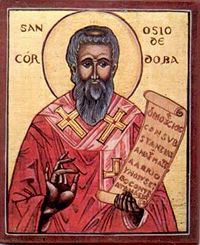Osie de Cordoba
Cel întru sfinți Osie Mărturisitorul, episcopul Codobei (cca. 256-358 d.Hr.) - cunoscut și ca Osiu, Osius sau Ossius - a fost un episcop roman al cetății Cordoba din Spania timp de mai bine de 60 de ani în secolul al IV-lea. A fost unul din sfătuitorii bisericești ai împăratului Constantin cel Mare, precum și un mare apărător al Ortodoxiei în partea de apus a Imperiului Roman împotriva ereziilor donatiste și ariene, care au tulburat Biserica Creștină în secolul al IV-lea. Osie este considerat a fi fost cel care a prezidat discuțiile la Sinodul I Ecumenic din Niceea. Prăznuirea lui în Biserica Ortodoxă se face la 27 august.
Viața
St Hosius was probably born in Roman Córduba in Hispania, although a passage in Zosimus has sometimes been conjectured as the writer's belief that Hosius was a native of Egypt.
Consecrated bishop of Córdoba (ca.295), he narrowly escaped martyrdom in the persecution of Maximian (303-305). In 305 or 306 he attended the council of Elvira (Granada), and upheld its severe canons concerning such points of discipline as the treatment of those who had abjured (lapsed) their faith during the recent persecutions, and questions concerning clerical marriage.
From 312 to 326 Hosios acted as ecclesiastical adviser at the court of the holy emperor St Constantine the Great, who in 324 sent him as imperial emissary to the East to settle the Arian dispute. Hosius convoked a synod at Alexandria of Egyptian bishops and another at Antioch of Syrian bishops, at both of which Arius and his followers were condemned.
The saint also advised St. Constantine to convene the First Ecumenical Council at Nicea in 325, where Hosius was influential in securing the inclusion in the Nicene Creed of the key word homoousios. He was the first to sign the acts of this Council.
After a period of quiet life in his own diocese, Hosius presided in 343 at the Council of Sardica (now Sofia in Bulgaria). There and afterwards he spoke and wrote in favour of Athanasius of Alexandria, who was a principal opponent of Arianism.
The prestige given to the Orthodox cause by the support of the venerable Hosius led the Arians to bring pressure to bear upon Emperor Constantius II (who is often considered an Arian), who had him summoned to Milan where Hosius declined to condemn Athanasius nor to extend communion to Arians. He so impressed the emperor that he was authorized to return home.
More Arian pressure led to Constantius writing a letter demanding whether he alone was going to remain obstinate. In reply, Hosius sent his courageous letter of protest against imperial interference in Church affairs (353), preserved by Athanasius (Historia Arianorum, 42-45) which led to Hosius' exile and detainment in 355 to Sirmium, in Pannonia (in modern Serbia).
After being subjected to threats and physical violence, the old man Hosios, who was near his hundredth year, signed the Arian formula of Sirmium (357), and only then was he permitted to return to his diocese in Córdoba, but he retracted his signature before he died.
Surse
- St Hosius the Confessor the Bishop of Cordova. OCA - Feasts and Saints.
- "Hosius Of Córdoba." Encyclopædia Britannica. Encyclopædia Britannica 2009 Ultimate Reference Suite. Chicago: Encyclopædia Britannica, 2009.
- Hosius of Corduba at Wikipedia.
- Myers, Edward. "Hosius of Cordova." The Catholic Encyclopedia (New Advent). Vol. 7. New York: Robert Appleton Company, 1910.
- Great Synaxaristes: Format:El icon Ὁ Ἅγιος Ὅσιος Ἐπίσκοπος Κορδούης τῆς Ἱσπανίας. 27 Αυγούστου. ΜΕΓΑΣ ΣΥΝΑΞΑΡΙΣΤΗΣ.
